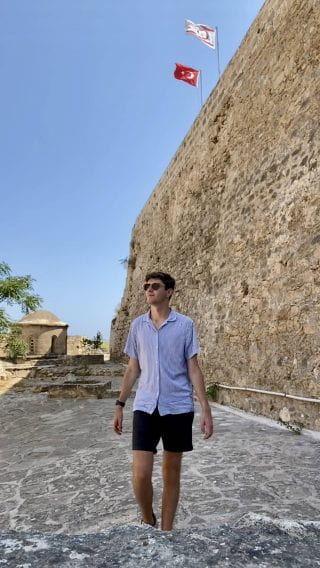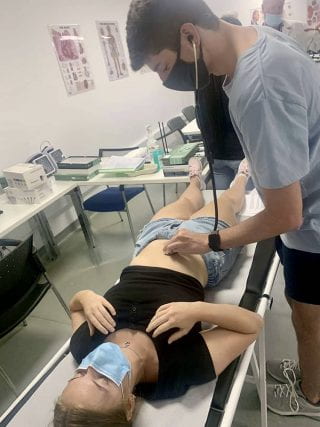 |
| Tyler visits Kyrenia Castle in the Turkish Republic of North Cyprus. |
Blog post courtesy of the Honors College
Bodenhamer Fellow Tyler Merreighn, an honors public health and biology major, signed on to study abroad at the University of Nicosia in Cyprus because the program offered a rare opportunity for undergraduates to study anatomy on a med school campus. This included access to cadavers and hands-on (literally!) practice in conducting physical examinations. Tyler also found fascination in the rich interplay between Western and Eastern influences in Cyprus, and the stark contrasts in cultures along the U.N. buffer zone that divides the country.
Situated in the eastern Mediterranean Sea only an hour’s flight from Athens and the Middle Eastern cities of Beirut and Tel Aviv, Cyprus’ history has largely been shaped by Western and Eastern influences. Studying abroad in a Greek-speaking country with such a complex interplay of cultures was an incredibly rewarding experience.
Exploring East and West on One Island
Each weekend, Global Semesters, the University of Nicosia’s study abroad program provider, brought the members of our program to a different city in Cyprus. One weekend, we traveled to Larnaca in the south of the island. Our first stop in Larnaca was the Hala Sultan Tekke, a mosque that houses the tomb of Umm Haram, who theologians currently theorize was the nurse of the prophet Mohamad when he was a baby. Our next stop was Saint Lazarus Church, built around 890 A.D. and regarded as one of the best examples of Byzantine architecture in the world. Lazarus of Bethany, who the church honors, is the biblical figure who Jesus resurrected four days after his death. Although the vast majority of southern Cyprus is of the Orthodox Christian faith, seeing these two religious structures provided context on the strong influences in Cyprus of two of the world’s Abrahamic religions — Christianity and Islam.
Politics in Cyprus is different than anywhere else in the world. The only United Nations buffer zone on the planet runs east-west across Cyprus and divides the island nation roughly into northern and southern halves, the result of a Turkish invasion of the island in 1974. The south is controlled by the Cypriot government. The northern region, known as the Turkish Republic of Northern Cyprus, is a de facto state still controlled by the Turkish government and recognized by the rest of the world as Cypriot territory nearly 50 years after the invasion. It is only possible to get from one side of the U.N. buffer zone to the other through checkpoints located along the zone. On our last weekend, my newfound friends and I chose to travel independently from the program to the north through the checkpoint in the island’s capital of Nicosia. On the northern side, it seemed as if the city had been frozen in time. The streets were empty and storefronts were shuttered and outdated, but you could hear the call to prayer echo throughout the streets. The Turkish Republic of Northern Cyprus is almost entirely Muslim, and it was an unparalleled experience to see such a stark contrast in way of life walking a few hundred feet through the checkpoint from one side of the U.N. buffer zone to the other.
 |
| Tyler conducts a practice respiratory exam on a classmate. |
Hands On Practice for Pre-Med Students
Cyprus not only offered a unique cultural and historical experience, but it also provided a unique academic experience. The month I spent in Cyprus will undoubtedly be a learning experience I cherish for the rest of my life. During my time abroad, I studied Special Topics in Anatomy and Clinical Skills and Management of Care. Instruction of our anatomy course took place on the medical school campus, and I had the opportunity to learn from cadavers. When I found out about this while exploring programs online, that fact alone almost sold me on the program. Learning in an actual cadaver lab is not an opportunity that’s often found at undergraduate schools in the United States and I’m certain it’s not one at the University of Arkansas, so it seemed like an obvious choice to go experience this in Cyprus. The knowledge I gained from the more than 20 cadavers at the medical school is invaluable, and it was a humbling experience having the opportunity to learn from them.
The other portion of our anatomy course revolved around clinical skills, and it instilled in me a confidence that I’m sure I can bring with me to the medical school application process. In this section of the course, our instructors demonstrated how to perform clinical skills such as respiratory, intermediate cardiovascular, abdominal, and rectal examinations, and then they allowed us to practice those skills on each other and on mannequins. Learning anatomy and clinical skills from instructors at the University of Nicosia Medical School turned out to be an experience that further solidified my decision to pursue medicine and gave me a confidence to continue.
The other course I was enrolled in while in Cyprus was titled Management of Care. In this course, we explored complex topics like physician-assisted suicide, determinants of health and perceptions of health. We were also guided in exploring the health system in Cyprus and other health systems within the European Union. Our challenge was to then compare the various aspects of these systems, such as insurance, price regulation, government spending, efficacy and equity with the United States. This course provided an opportunity to critically analyze the health system we rely on daily in the United States and find ways in which we can improve on it by comparing it to systems found within the European Union. There’s not a course like this at the University of Arkansas, so I’m thankful for this unique touch to my undergraduate experience.
If you’re reading this and looking for a cue to study abroad yourself, then you can consider this your cue. My study abroad experience in Cyprus was an opportunity that I wouldn’t trade for the world, and I know it’s an experience that will help me stand out in my medical school applications. If you’re reading this and hoping to experience a study abroad program that is culturally, academically and personally enriching, then you can look no further. Cyprus was just that for me, and I’m sure it can be that for you. Oh, and if you’re wondering what I did as soon as I got home: I ate at the nearest Raising Cane’s. The gyros were good, but there were just SO MANY!
--
Learn more about Tyler's program in Nicosia, Cyprus.
You can start planning your adventure abroad today! Dive in to our Explore page at https://studyabroad.uark.edu/explore/index.php, and start your program search at http://studyabroad.uark.edu/search/
You can start planning your adventure abroad today! Dive in to our Explore page at https://studyabroad.uark.edu/explore/index.php, and start your program search at http://studyabroad.uark.edu/search/
